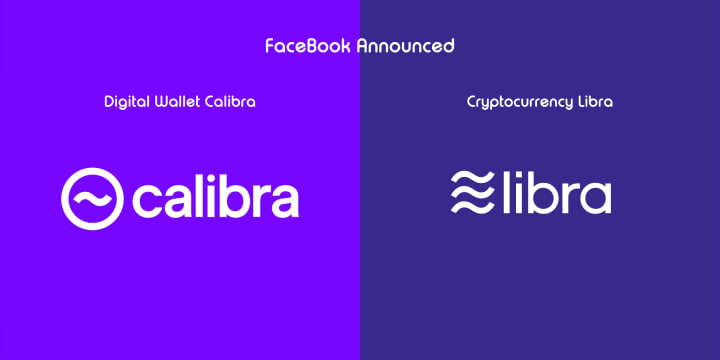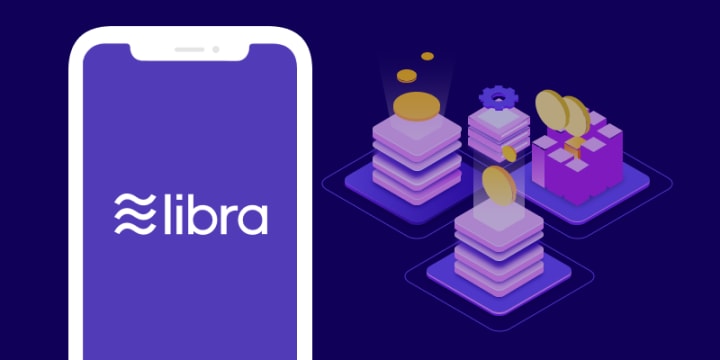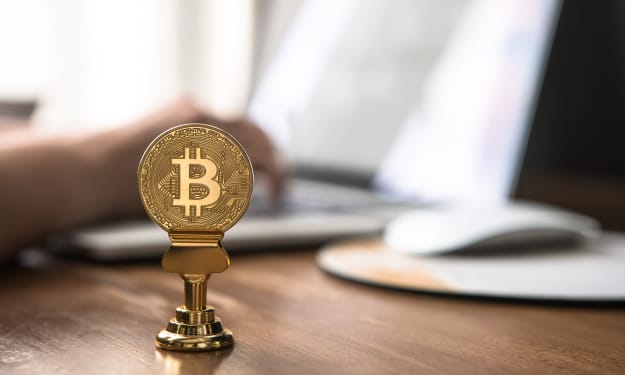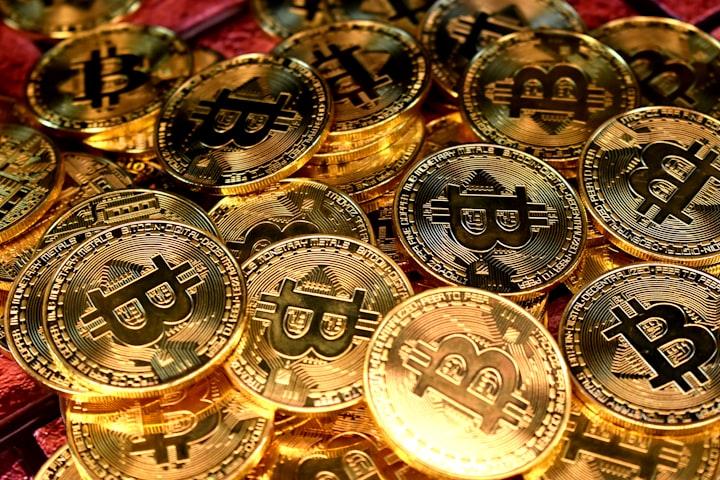What Is Facebook's New Digital Currency Libra?
This is a comprehensive guide to everything you need to know about Facebook's new digital currency, Libra.

No longer are the days that people are asking, "Is Facebook coming out with a cryptocurrency?" On June 17, 2019, Facebook announced its newest product, exactly that (a cryptocurrency), which they are planning to launch in 2020. The company seems to be constantly expanding. They were even called out recently by prior co-owner Chris Hughes, who stated that he thinks Facebook should break up its monopoly. He believes that the social media giant should be government regulated. However, Facebook seems to disagree, as it continues to expand in every possible way.
Facebook's new digital currency, Libra, is being presented as some kind of saving grace. It has displayed their idea for this new digital currency as a global currency that will be helping people all over the world. What it really seems like is Facebook is trying to take over the world...
According to Facebook, 31 percent of the global population does not have access to a bank, making transferring money a challenge. Facebook is suggesting that cryptocurrency is the answer for many of these people who, for one reason or another, do not have access to a bank. After all, cryptocurrencies utilize decentralized control mechanisms, open source software, and a level of security that is incredibly complex. These cryptocurrencies have not caught on with the general public, which Facebook states is due to their high volatility. However, Facebook's Libra has some major differences from other cryptocurrencies. Still, some people critique these differences as the elements that make a cryptocurrency what it is, and are having a hard time buying into Libra's legitimacy.
My First Question
The first thing I wondered when hearing about this new product was: "Why is it called Libra?" For those of you who might be wondering, the Libra is the Roman unit used to measure weight. TechCrunch stated that, "It’s trying to invoke a sense of financial freedom by playing on the French stem 'Lib,' meaning free." The "Libra" will be the unit of measure of the currency, as in one Libra will buy you a soda. (You get the idea.)
Features

Image via MobCoder
Users will be able to spend their money using a third-party wallet app. Facebook is launching its own wallet app, (of course) Calibra Wallet, which will be available in 2020. Facebook also states that this is not the end of their efforts to break into currency management, there will be more. They are planning to offer additional services in the future, like the ability to pay your bills through the app. They advertise the ease of alternate payment systems, such as buying a coffee with Libra (THANK GOD, because buying a coffee right now is so difficult). It has also created its own type of blockchain, which is a necessary component for managing a cryptocurrency. However, their Libra blockchain will be different from that of other, existing cryptocurrencies.
The chief of cryptocurrency at Facebook even stated that if users do not trust their digital wallets, they should use a different one, which is a little unsettling.
“If people don’t want to trust us, they can use any of the other wallets that will be available.” —David Marcus
The Main Differences

Image via GBKSoft
The Libra differentiates itself from other cryptocurrencies like Bitcoin, stating that it will be a low volatility cryptocurrency. This will be done by backing the coin with multiple "real" currencies; however, the company has not confirmed yet which currencies will be backing it. They did state that it will be tied to more than one currency, in order to keep it steady, and they will have the ability to alter the exchange rate to standardized how much Libra will be worth.
It also states that, as opposed to other cryptocurrencies, it will abide by real world financial regulations, and that it will have nearly zero fees. In Facebook's description of the Calibra Wallet, they made sure to stress the fact that users' information will be kept private, and they will not use the data to improve the Facebook network. (We will see about that.) This is a crucial element of Facebook's mission, as many people are lacking trust in the social platform at this time. Whether or not people trust Facebook with their money will be a determining factor in the success of this new digital currency.
Facebook seems to know that it does not have the total trust of the public at this time too, and therefore is trying to disperse the responsibilities out to hopefully gain the trust of the people again. The currencies' governing agency has already been announced. Located in Switzerland (because of its neutrality), it will include representatives from (so far) 28 major companies; including Paypal, Mastercard, Uber, and Spotify. However, Facebook has stated that they wish to expand the members to 100 by the time the Libra launches in 2020. Interestingly, Facebook will only have one vote, along with all of the other representatives of the Libra Association. Each of these companies have reportedly invested $10 million in this venture already.
What Facebook seems to have done is take a currency that traditionally functions on its own, free of a governing "associations," and made it extremely expensive to keep going.
Another unique feature is that these companies will be a part of a ledger, or record of all transactions. This means that these companies will be responsible for validating the transactions that take place; rather than functioning as a traditional blockchain network, largely responsible for working on its own.
Money held in the Calibra Wallet will earn interest, which members of the Libra Association will collect to keep the value of the Libra stable. The fact that they are keeping your interest does not encourage me to sign up.
Critiques
Practically the second the concept of the Libra was released, people began voicing their opinions. There was everything from not trusting Facebook to the Libra not being a cryptocurrency at all.
Eric Posner of The Atlantic wrote,
Facebook, one of the world’s most distrusted companies, wants us to trust its new Libra cryptocurrency, which, it hopes, will be used by billions of people around the world. We shouldn’t. Libra will almost exactly replicate all the problems generated by Facebook’s social network.
The Libra is not using traditional blockchain technology and does not operate on an open-sourced platform. Previous cryptocurrencies have not used a governing agency, because they do not have the need for one, whereas the Libra will be regulated. The way that other cryptocurrencies are set up is neutral and public, while it does not seem that the Libra is truly either of those things. The Senate is even getting involved, setting a hearing to question the Libra's intentions to follow regulations; begging the question, "Why do governments hate Bitcoin, Libra, and other cryptocurrencies so much?"
And then there are also those Libras, who are offended by the name...
The Importance?
Facebook advertises that this product will be helpful for those 1.7 billion people who are without a bank, and I do see how cryptocurrency can help the global economy, but what is the use to me? I am a young person living in America; I already have a bank account, and that offers more financial services than a cryptocurrency ever could or would, so what do I need this for? Yes, I do a lot of online shopping, but I have a Paypal account, and it serves its purpose. I happen to like Paypal a lot. Why would I need to convert my money into digital currency or cryptocurrency if many services are already performing well in a sphere where Facebook has never been too before?
Yes, it would prevent me from having to exchange my money when traveling, (assuming international vendors actually accept Libra), but the way credit cards are today, that is not even really necessary. If you are not a big traveler, you probably don't mind exchanging money for local currency on the rare trip abroad either.
The rest of my money, I keep in a savings account, where I actually get to keep the interest earned on it. If I wanted to profit more off of that, I always have the option to my hard-earned cash in a money market account, or some other type of investment where it could continue to grow. I think that many Americans would agree that we do not have enough financial data about cryptocurrencies in general to convince the masses to convert their dollars into digital currencies. After all, the reason Bitcoin did so well for a while is due to its volatility, and people only invested in it with hopes to win big.
Truthfully, I would absolutely not trust Facebook with my money. Facebook's new digital currency Libra is just proof that the company is looking out for itself, and looking for new ways to make money while trying to play it off like they want to help people in need.
However, with that being said, I can picture people trying it out of curiosity, but I cannot understand what good that is to the average person. If I have not used any other type of cryptocurrency like Bitcoin, why should I care about Facebook's?
Either way, it should be really interesting to see play out.
About the Creator
Ringo Mendoza
Wants to be a DJ but too anxious. Spends too much time on social media and can name most cheese by smell alone, for some reason.






Comments
There are no comments for this story
Be the first to respond and start the conversation.